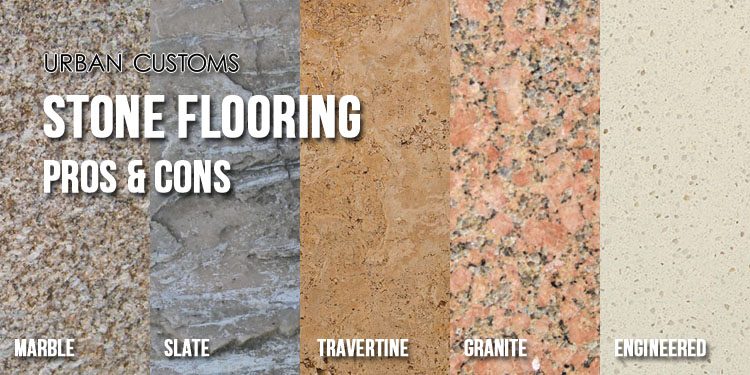Stone Flooring Pros & Cons
If you are searching for the pros and cons of stone flooring tile, this post should help! Here we list the pros and cons of all different types of natural stone flooring.
When installing or upgrading your flooring, natural stone is among the most fashionable and stylish material options available. It can be used indoors or outside, and for any room in the house!
However, prior to making a final selection, there are a few things you need to know.
Homeowners often choose from five types of natural stone, but is one of them right for your project? We will cover the details of each type of natural stone variety below, including the best environment and areas they could require extra care. With this information, you should be able to determine the type of natural stone flooring that is best for your requirements.
Stone tile flooring adds timeless elegance and natural beauty to any room in the home. Stone tile is a wonderful way that brings the beauty of the outdoors, inside. Stone tile comes straight from the earth, making each tile different, which will have its own natural variations. Stone tile is a perfect choice for its durability and luxury. They provide a high-end look at an affordable price, and they’re somewhat easy to maintain. They’re easy to clean and most varieties only need periodic resealing. Their durability and beauty make them ideal for higher traffic areas.
Stone Flooring Pros – Stone flooring can tolerate heavy foot traffic, creates a naturally elegant look, doesn’t attract dust, and can increase your home value. Stone Flooring Cons – Stone flooring costs more, can scratch easily, is harder to replace.
Stone Flooring Pros
- Durability: it can tolerate heavy foot traffic
- Creates a natural, elegant look that you just can’t get with other materials
- Doesn’t attract allergens or dust (cleans easily)
- Adding stone tile to your home can increase the home’s value, making it easier for you to sell in the future
- Because each stone is different, you can give your home an undoubted one-of-a-kind look
Stone Flooring Cons
- Varying porosity—some types of stone need to be treated with a sealing agent regularly to prevent damage from liquids
- The cost can run higher than your budget allows
- Some stones are more brittle and can chip easily
- Natural deviations can produce the risk of running out of matching pieces before the floor is finished
- Some polished stone scratches easily
Now that you have a better understanding of the pros and cons of stone flooring, read on to find out more about some of the most popular types of stone, including their characteristics and potential drawbacks.
Table Of Contents
- Marble Tile Flooring Pros & Cons
- Granite Tile Flooring Pros & Cons
- Slate Stone Flooring Pros & Cons
- Travertine Stone Flooring Pros & Cons
- Engineered Stone Flooring Pros & Cons
Marble Tile Flooring Pros & Cons
Marble is created by limestone crystallizing from high temperatures and pressure while under the ground. During the crystallizing process, it becomes denser and harder. It is the hardness that provides its ability to be smoothed and polished during creation. Marble, like any natural stone, requires protective sealant applications prior to use, which needs to be maintained and regularly reapplied for full protection. Because marble is not stain-resistant, it is important that spills are quickly cleaned up to avoid the possibility of stain damages. Daily substances that contain acids can all cause damage or stain the marble if not immediacy cleaned up, including vinegar, alcohol, tomato products, fruit juices, salad dressing, mustard, coffee, tea, and cosmetics. “The biggest advantage of marble floor tile is that it can instantly elevate the appearance of a space, giving it a regal bearing that is hard to imitate.” [1]
Pros: Amazing patterns, beautiful color, and unique as two tiles are never the same.
Cons: Susceptible to stains, quickly shows wear from acid-based products.
Granite Tile Flooring Pros & Cons
Granite is known for being one of the hardest types of natural stone, a common factor for it being used within kitchens. Granite gets created as magma cools underground. Due to the very slow cooling process, granite builds hardness and strength throughout this lengthy process. It is created from various minerals, including feldspar and quartz, giving it a granular texture and composition. Although, granites strength also provides its weakness. Due to granite being extremely hard with an unforgiving characteristic, when it is installed as flooring, it requires the subflooring to be leveled completely while having the strength of supporting the weight. In the event the subflooring has any tiny valleys or bumps, it can cause granite tiles to easily crack.
Pros: Hard surface, beautiful color, withstands normal wear, and tear. “Having granite tile floor installed in your home will also increase the overall value of your property, due to the excellent quality and durability of granite.” [2]
Cons: Among the heaviest options in flooring, requires proper support.
Slate Stone Flooring Pros & Cons
Slate is created deep within the earth from the proper combination of pressure and heat. Slate tile provides a slightly uneven and dull appearance compared to other natural stone options. This is one reason it is so popular, as it provides a slip-resistant tile for flooring. It is available in a range of patterns and colors, which often gives a modern or rustic appearance and feel. Compared to other natural stone options, slate is more stain-resistant, highly durable, and handles water well. Although, if subflooring is uneven slate can be cracked, or from heavy objects dropping on the tiles. Due to slate being formed within layers, it has been known to peel or flake in rare cases. Because of this, it is important that slate tile is immediately treated with a sealant after installation, and well maintained with reapplying sealant regularly.
Pros: Provides dark, natural, rustic and earthy colors. Often more resilient compared to other stone options. “High quality slate flooring has many good characteristics. It is naturally slip and stain resistant.” [3]
Cons: Tiles may be uneven from quality of tile layering.
Travertine Tile Flooring Pros & Cons
Travertine is often compared with marble or limestone, as it is created similarly. It is composed of calcite, a sedimentary rock. In addition to modern use, Travertine is a stone that’s been used worldwide for centuries, one popular example is the Colosseum in Rome. Because Travertine is a porous stone, as formation causes natural holes it requires a protective sealant prior to grouting, and after the installation as well. Travertine soaks up liquids, meaning it will stain if it is not treated, and spills are not quickly cleaned. Travertine is prone to stains from various acidic food, and due to being softer than other natural stones, it will be susceptible to showing wear, tear, and scratches.
Pros: Travertine provides earthy, rich tones. It feels softer due to the softer natural formation.
Cons: It scratches easier and stains without treatment. “One cons of travertine tile is that it is very porous and has a lot of holes. These holes can show some signs of wear and tear after a while.” [4]
Engineered Stone Flooring Pros & Cons
Engineered stone flooring tile is made out of bits of rock and marble that is set in an epoxy base. This type of stone tile comes in a variety of designs and colors. “Because it’s man-made rather than hewn from natural stone, agglomerate tile has very precise, predictable measurements” [5]
Pros: Comes in a variety of designs and colors
Cons: Can dull and chip over time, which results in high maintenance requirements
Considering Stone Flooring Installation In Phoenix, Arizona?
Urban Customs is Phoenix, Arizona’s premier natural stone flooring installer with the experience and knowledge necessary to make your flooring installation a breeze. Check out our flooring installation services.
Contact us today to speak to one of our flooring experts and find which natural stone tile will work best for your project.
Cited Sources
- “Marble Flooring Pros and Cons.” The Spruce, www.thespruce.com/marble-flooring-pros-and-cons-1314701.
- “The Pros and Cons of Granite Tile.” FIVE STAR CHEM-DRY, 18 Oct. 2017, fivestarchem-dry.com/pros-cons-granite-tile/.
- “Pros and Cons of Slate Flooring | HomeAdvisor.” Home Improvement Tips & Advice from HomeAdvisor, 14 Sept. 2017, www.homeadvisor.com/r/slate-flooring/.
- “Travertine Tiles: Pros and Cons.” Travertine, www.travertinemart.com/travertine-tiles/travertine-tiles-pros-and-cons.
- Beuerlein, Karin. “The Pros and Cons of Engineered Stone Tile.” HGTV, HGTV, 30 Sept. 2014, www.hgtv.com/design/decorating/design-101/the-pros-and-cons-of-engineered-stone-tile.
- “Pros and Cons of Custom Stone Flooring.” Imperial Wholesale Design Center Natural Stone Supplier Phoenix AZ Pros and Cons of Custom Stone Flooring Comments, https://www.imperialwholesale.com/inspiration-center/pros-and-cons-of-custom-stone-flooring.

